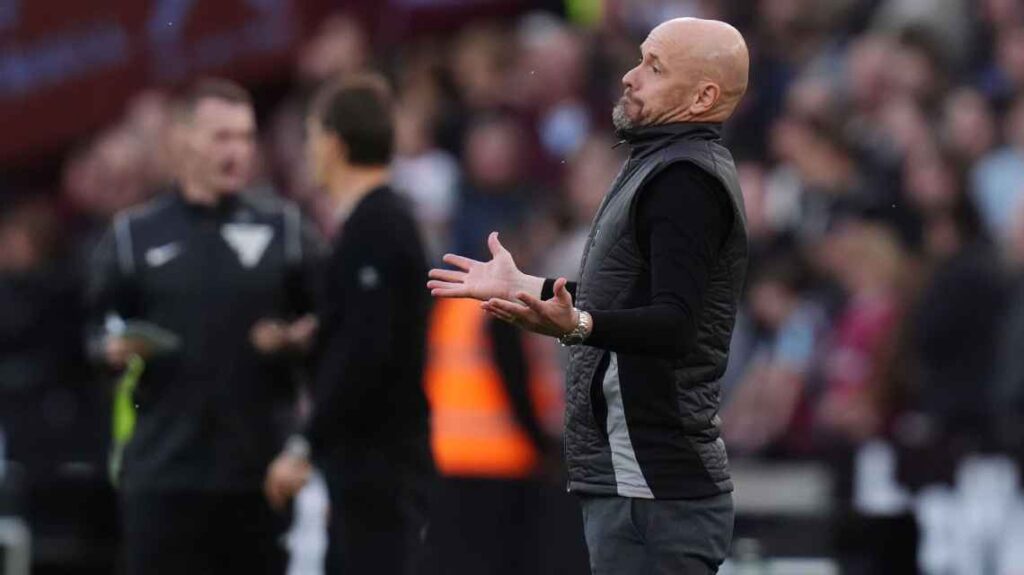
Manchester United, a team with one of the richest histories in football, has seen its fortunes dwindle since the days of Sir Alex Ferguson. Last season, United finished in a dismal eighth place, the lowest they’ve reached since the Premier League began in 1992. They ended with a negative goal differential, a record United hadn’t seen since 1990. With an influx of investment from billionaire Jim Ratcliffe and the expertise of footballing strategist Dan Ashworth, expectations were high for a turnaround this season. Yet, nine games in, United sits 14th in the table, having conceded more goals than scored and without facing key rivals like Manchester City, Arsenal, or Chelsea.
Here’s a look at five crucial numbers that led United to part ways with Erik ten Hag.
1. Points Per Game
One of the clearest indicators of a manager’s success is points per game. Since 2008-09, United have had six full-time managers, and Ten Hag’s points per game rate was among the lowest. Averaging about 1.7 points per game across 84 Premier League matches, United’s output under Ten Hag mirrored the disappointing numbers seen under David Moyes, who was fired for similar performance. For context, Ferguson’s teams consistently achieved over 75 points per season, while even Mourinho’s lowest point was 69. Ten Hag’s tenure failed to meet these standards, showing no sign of recovery.
2. Goals Conceded
United’s defense has been fragile under Ten Hag, conceding goals at an alarming rate. On average, United allowed more than 50 goals per season under his management, worse than the Premier League’s average mid-table teams. His defensive setup allowed opponents more shots and higher-quality chances than under any previous manager. United also conceded a record 30 opponent touches in the penalty area per game, a statistic that severely hampers any chance of controlling the game. Unlike many managers who balance aggressive defense with strategic concessions, Ten Hag’s United had the downsides of both aggressive and passive approaches, leading to consistently poor results.
3. Goals Scored
A fragile defense is often balanced by a strong attack, yet United’s scoring under Ten Hag was disappointing. Expected points suggested United were fortunate to finish as high as they did, ranking sixth in 2022-23 and 15th last season. This season, United’s expected goals vs. actual goals disparity is the largest in the Premier League. Despite some bad luck in converting chances, United still had a negative expected-goal differential. United’s creation rate was a mere 50.7% of the total expected goals in their matches, signaling that games were a coin-flip outcome, far from the dominance expected of a top club.
4. Pressing and Defensive Action
Ten Hag’s reputation from Ajax was built on his high-pressing, attacking style. However, two seasons in, this pressing approach never materialized at United. Manchester United ranked poorly in pressing metrics, allowing passes per defensive action (PPDA) and opposition pass-completion rates that were higher than under any previous manager. These numbers put United in the bottom half of the league for defensive pressing, a surprising result given Ten Hag’s initial promise to play “proactive football.”
5. Possession Control
Possession control is the core of any successful modern football club, allowing for higher scoring and defensive stability. Despite Ten Hag’s intent to dominate the ball, United’s possession stats were significantly lower than those of his predecessors. High-profile teams like Manchester City and Barcelona have achieved sustained success by controlling the game, a feat Ten Hag’s United failed to replicate. Instead, United’s possession stats were lower than any of the five previous managers, showing a clear gap between his tactical vision and its execution.
Conclusion
Erik ten Hag arrived with the promise of revitalizing Manchester United with a fresh, attacking style of football. However, the statistics tell a story of missed opportunities, a faltering defense, and a lack of control on the pitch. These five numbers reflect why Manchester United decided it was time for a new approach to return to the heights of English and European football.
